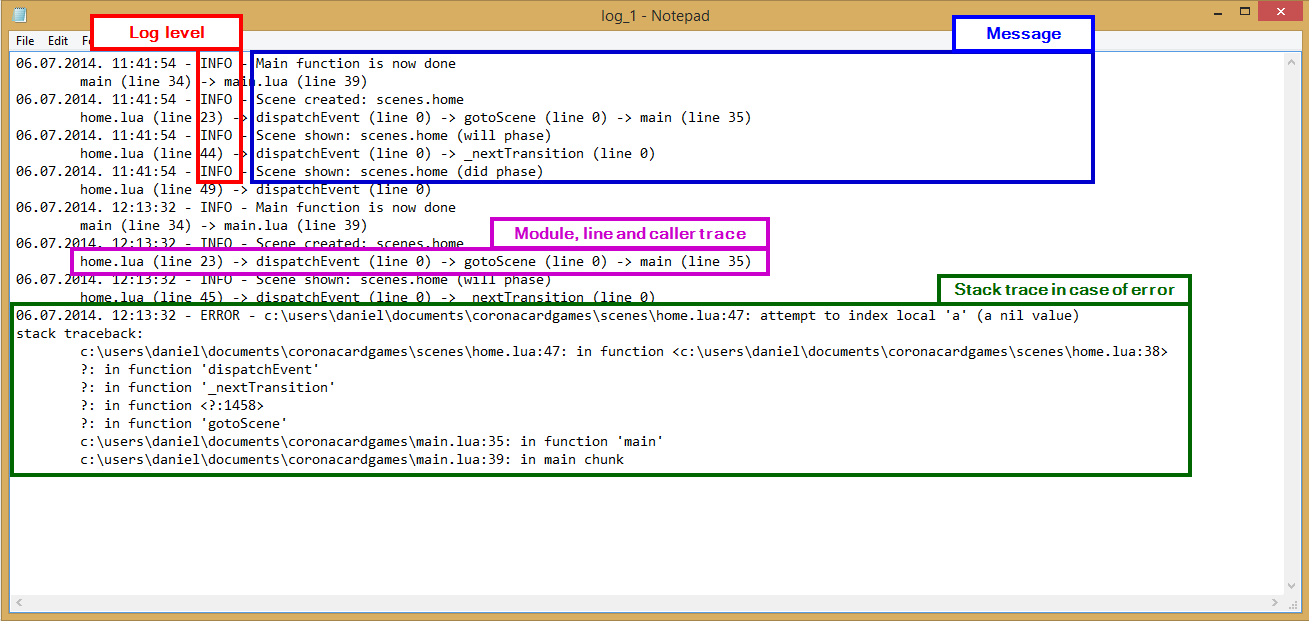Hi,
I would like to present my first public Corona / Lua module. Looking forward to your feedback and suggestions.
Repository: https://github.com/promptcode/CoronaAdvancedLogging
Used for error handling and logging events to console and a set of rolling text log files.
- Use it instead of print in your Corona project
- Your messages will be printed in console but also logged in text files
- Every message in log file contains time, log level and caller trace (module name and line number)
- A set of rolling text files is used so you can retrace the steps that lead to a bug
- Runtime errors get logged automatically (including stacktrace)
- Users get automatically prompt on runtime errors and can report them via email
- Application administrator receives device / platform info and log files in attachment
build.settings - required for better debugging on device
[lua]settings = {
build = {
neverStripDebugInfo = true
}
}[/lua]
sample.lua - you can test this is your main function or download sample project from GitHub
[lua]
– REQUIRE MODULES
local sqlite3 = require(“sqlite3”);
local log = require(“log”)
– SETUP DATABASE CONNECTION
– Required to use Advanced logging module
local path = system.pathForFile(“sample.db”, system.DocumentsDirectory)
db = sqlite3.open(path)
– SETUP ADVANCED LOGGING MODULE
– This is the simple setup, see properties and defaults
log:set(db, “your_email_adress@gmail.com”)
– TEST ADVANCED LOGGING MODULE
– Log your events, use log instead of print
log:log(“Advanced logging module is now ready”)
– Here we make an intentional error to test error reporting
asd = asd … “asd”
[/lua]
log properties - customize log module
[lua]-- Prefix for log files
log.fileNamePrefix = “log”
– Directory where to save log files
log.directory = system.DocumentsDirectory
– Maximum number of log files
log.numberOfRollingFiles = 6
– Set to true if you want to trace module name and line number on each info message
log.debugCalls = true
– Maximum depth for caller traceing
log.debugCallDepth = 4
– Maximum log file size in Bytes
log.maxFileSizeInBytes = 20480
– Database table name where to save log parameters
log.tableName = “log_params”
– Set to true if you want an alert to popup on runtime errors
log.alertErrors = true
– Title for runtime errors alert
log.alertTitle = “Oops, an error occurred”
– Text for runtime errors alert
log.alertText = “Please report this error to administrator on email:\n\n”
– 1st button for runtime errors alert label
log.alertButtonReport = “Report on email”
– 2nd button for runtime errors alert label
log.alertButtonDismiss = “Dismiss”
– Email adress on which to send error reports
log.alertEmail = “”
– Erorr report email subject
log.emailSubject = “Error report”
– Erorr report email text before device / platform into
log.emailPreText = "Hi\n\nI want to report an error in application. " …
“Logs files are attached. Here is my device info: \n”
– Erorr report email text after device / platform into
log.emailPostText = “\n\n Thank you.”[/lua]
Here is an example of log file contents.

Runtime errors get automaticly logged and user gets prompt to report error to administrator via email.

Administrator receives an email containing device / platform info and log files.

Regards,
Daniel
